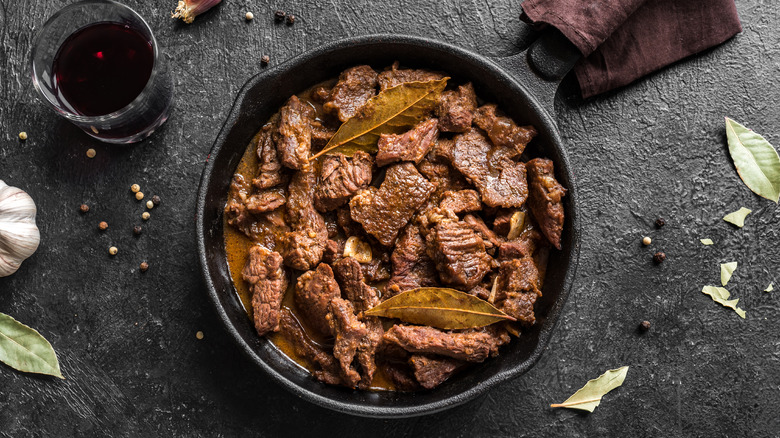Recent Survey Revealed A Shocking Amount Of Men Would Die Young Before Giving Up Meat
Humans have had a lengthy history of eating meat. According to History.com, we've been consuming animals for well over 2.6 million years. But it wasn't always this way. Hominins, distant ancestors of humans, were forced to shift their food source from things like fruits, leaves, seeds, and tubers to meatier fare as the Earth began to get hotter, which caused forests to shrink and made plant foods less plentiful.
The publication also notes that meat consumption plays a big role in human brain function. This makes it understandable why proteins like beef, chicken, and pork have become such a big part of everyday diets — and what makes it so difficult for some folks to give it up, even just a little bit. Despite there being sound science backing up the fact that eating less meat can be beneficial to the body, a new report by Men's Health reveals that 73% of men would much rather prefer their life expectancy drop than give it up.
Meat consumption is seen as a masculine trait
Tenderly reports that regardless of cultural background, men typically consume the most meat across the world. Why? Well, because society says that meat consumption is a masculine trait. According to The Swaddle, one study found that men who didn't eat meat were seen as less masculine than those who did. Another study reported in The Swaddle found that men apparently consumed more meat as a coping mechanism when they felt their masculinity was being threatened.
The report in Men's Health echoes these same sentiments. Ironically, 81% of the men that were interviewed for the study, which was conducted by Australian non-profit No Meat May, considered themselves friends of the environment despite being aware of the impact meat production has on the environment. When asked if they'd reduce their meat consumption, 79% of them still said that they wouldn't. Not only that, but 73% of men surveyed would rather "reduce their life expectancy by up to 10 years than give up eating meat." No Meat May's study also confirms the stereotypical perception that the more meat a man's diet possesses, the manlier they seem.
There are benefits to reducing one's meat intake
Regardless of why someone chooses to implement a diet that is either fully or partially plant-based, they will be doing a service to their bodies, per the American Heart Association. The AHA explains that the less meat consumed, the smaller the chances are for a person to develop things like heart disease, obesity, high blood pressure, high cholesterol, type 2 diabetes, or experience a stroke. When eaten in excess, the cholesterol and saturated fat in meat are big contributors to heart disease — especially if the meat has been heavily processed, like deli meat, bacon, or sausage.
When someone decides to pursue a more plant-based lifestyle and diet that is focused on consuming plenty of fruits, veggies, and legumes, the Mayo Clinic notes that the body will receive more nutrients, vitamins, and fiber. But what can folks eat in order to maintain their daily protein intake? Healthline suggest foods like seitan, tofu/edamame, legumes, nutritional yeast, hempseed, and spirulina.


